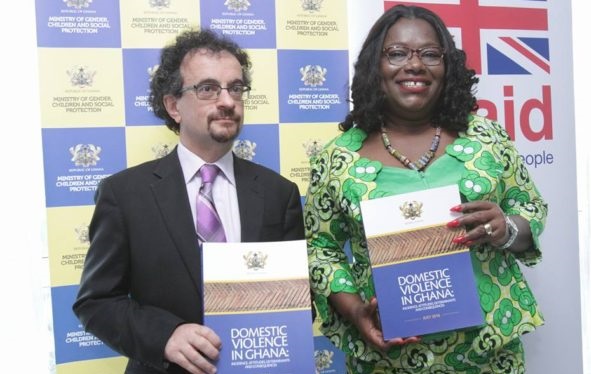
Report on school-based sexual violence launched
The Gender Studies and Human Rights Documentation Centre (GSHRDC), a non-governmental organisation promoting women and children’s rights in Ghana, has launched the report of a national study on “School-Based Sexual Violence (SBSV) in Accra.
The launch formed part of activities under the organisation’s two-year project on the theme: “Cell Phones Against Sexual Violence, Using Mobile Technology to Promote Safer Schools.”
The project is in collaboration with Voto Mobile, a social enterprise that helps its partners to distribute and collect information through their mobile phones, and with funds from Amplified Change, a fund that is aimed at empowering people to realise their sexual reproductive rights.
Survey report
The survey report was based on a national, mobile-based survey with 3,671 Ghanaian youth respondents, made up of 56 per cent females and 37 per cent males, who were disturbingly exposed to school-based sexual violence and experienced sexual violence.
Speaking about the report, the data analyst and fellow researcher, Miss Erin Aylward, said majority of sexual violence cases appeared to have taken place in early stages in schools, stressing, “over half of all reported cases of SBSV, 57 per cent, occurred while the youth were in primary or junior high school.”
She indicated that most of the respondents experienced sexual violence at the hands of a teacher or principal and that suggested that on average one out of every 11.5 girls and one out of every 30 boys in Ghana would experience sexual violence perpetrated by a school authority figure.
The survey, which was done in all the 10 regions of Ghana, had varied results in reported frequencies of sexual violence, with 44 per cent female and 33 per cent males in Greater Accra and 57 per cent females in Upper West.
She also said there was a wide variation in the number of respondents, with 645 in Greater Accra and 160 in the Upper West.
Seeking justice
The report further indicated that most of the survivors of sexual violence had problems in seeking justice or getting support and for that reason 63 per cent of the respondents indicated that they had never reported their experience to anyone due to fear and punishment.
Regardless of whether or not the respondents reported their experience, she said it was clear that SBSV could generate harmful consequences for its victims such as leaving them pregnant and dropping out of school. “Nine per cent of the female respondents reported to have become pregnant on account of rape,” she said.
A Project Officer and the Hotline Operator of GSHRDC, Miss Ama Asubonteng, said the centre, with the help of Voto Mobile, had established a hotline service for the youth with sexual-related issues to call for counselling.
“The hotline service is to help boost the confidence of those who could not share their sexual violence issues or anything related to sex and also help them share their stories and views,” she said.
Awareness-raising campaigns
She urged organisations in the society to undertake regular awareness-raising campaigns on sexual reproductive health rights for the youth to be enlightened on their rights to live a violence-free sexual life and also pleaded with the Ghana Education Service (GES) to ensure that teaching staff who had been found to have sexually abused any pupil were reported to the police for the law to take its course.
She cautioned parents to listen to their children and believe them “whenever they report such cases instead of chastising them.”
“Provide for your children in order to reduce transactional sexual relationships that the youth, especially young women, may feel obligated to pursue,” she said.
“Provide for your children in order to reduce transactional sexual relationships that the youth, especially young women, may feel obligated to pursue,” she said.

 Click the link to read your copy.
Click the link to read your copy.